COVID-19 through the eyes of a local doctor
“Some feel pressured to choose a side in all of this. You either believe in masks or you believe in opening businesses and schools. This doesn’t make any sense,” Wimberley EMS Medical Director Steven Moore, MD, said. “If you wear a mask, wash your hands, and practice social distancing, then you are doing what you can to ensure that businesses and schools open responsibly.”
As required by state law, EMS facilities must operate under the medical license of a board-certified physician with specific qualifications. For the Wimberley EMS, that person is Moore. He isn’t a paid employee of the EMS, but he volunteers to oversee and help develop the protocols they use. For his day job, Moore is a specialist in Emergency Medicine for the University of Texas Health San Antonio. He deals with patients with COVID-19 first hand. He wanted to answer some of the questions he has heard around the community when it comes to COVID-19 as well as share his opinion on some local topics related to the disease.
IS COVID-19 JUST LIKE THE FLU?
“I’ve heard things like COVID is just like the flu. It’s not,” Moore said. “If you talk to any physician that has treated it… I’ve never seen anything like it. It is a really unpredictable disease. A lot of people get infected and they don’t have any (symptoms). Some people don’t taste or smell anything. And then some people get really really sick and they can’t breathe… People with Flu A and Flu B pretty much all look the same. Runny nose, cough, their eyes look the same, the same kind of fever pattern. Everybody looks the same. With COVID, it affects everybody differently. You may see an entire family that has COVID and every one of those people presents differently.”
DO MASKS WORK?
“There is plenty of evidence that masks work. There are individual studies and then you look at anecdotal evidence. Large gatherings where people wear masks, those people don’t seem to get sick. Large gatherings where people don’t wear masks, a lot more people seem to get sick… I think there is enough evidence, and the CDC supports this. All of us embrace the fact that masks probably work.”
“Many people are asymptomatic carriers of the SARS-CoV-2 (the virus that causes COVID-19). When you wear a mask you’re not just protecting yourself, you’re protecting other people. It’s the right thing to do.”
DO I NEED TO BE WORRIED IF I DON’T HAVE ANY UNDERLYING HEALTH CONDITIONS?
“Just because you don’t have anything wrong with you doesn’t mean you are not going to get severely sick with this. There are plenty of people that do. We see this in all ages too, from infants to the elderly. People with highest risk for severe disease include those with underlying medical conditions like heart and lung disease, cancer, or severe obesity. When you look at people who die from this, medical conditions and advanced age put you at risk, for sure. But again, we see previously healthy people die from this too.”
ARE THERE ANY EFFECTIVE TREATMENTS?
“Regarding remdesivir, the antiviral medical, there is good evidence that it will shorten the recovery time from COVID in patients that are hospitalized, and some signs that it may lower the risk of death as well. So it helps if you’re really sick, but it is not a “cure”. If someone is sick enough to be hospitalized for COVID and requires oxygen, dexamethasone reduces the risk of respiratory failure and death. Again, it is not a cure. There are other therapies like convalescent plasma and monoclonal antibodies that we’re not so sure about their effectiveness. ECMO is basically a type of heart or lung bypass machine that can be life-saving for the right patient. But these are in short supply and, this past summer, there weren’t enough machines to go around. It was heartbreaking. Finally, there just isn’t any compelling evidence that hydroxychloroquine is effective. We don’t use it on our patients, and I don’t know anyone working in the hospital that does right now.”
WHAT ABOUT A VACCINE?
“The data coming out regarding a vaccine is really promising. It would be so great to have a light at the end of this tunnel. How far we have come in less than a year is simply amazing. Vaccines often take over a decade from the time the work has begun to the time they are available to the public. The two most promising vaccines we have right now will still need FDA approval, this may take a few weeks. I believe the first stop will be frontline essential workers. The logistics of this is being worked through. What will be challenging will be getting everyone to get vaccinated once it becomes available. Polio, smallpox, H. influenza have all been great success stories. This could be another success story. I’m hopeful. Next summer, maybe? We’ll cross our fingers.”
WHAT ABOUT THE SCHOOLS REOPENING?
“I was a proponent of kids going back to school, if done correctly. The American Academy of Pediatrics has also been supportive of children returning to school, considering in-person school as vital for the overall health and well-being of children. As an ER doctor, we see the effects of physical abuse on children. Nationally, we understand that teachers are essential in detecting and reporting abuse. I feel strongly that our teachers help keep our kids safe, especially during stressful times like these. They’re truly heroes. So, I agree with the AAP recommendation to do in person school as long as you do what you are supposed to do. Wear a mask, wash your hands and social distance… I think we did it well. The first kids to go back were younger kids, K-5th grade. I think we phased it in. I think we are doing OK with it. I think we are doing well.”


